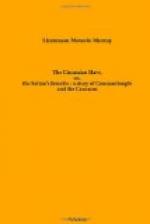Having no mental occupation, the poor boy. who was, as far as his physical developments went, a specimen of rare youthful beauty and grace of form, employed a large portion of his time in such exercises and feats of agility as a sort of animal instinct might lead him to attempt, and thus Komel was often startled by suddenly beholding him dangling by his feet from some lofty cypress, swinging to and fro like a monkey; or to observe him turning a series of summersets, in a broad circle, with such incredible swiftness as to cause all distinctness of his form to be lost, producing a most singular and magical appearance. Then, perhaps, after forming a circle thus on the green sod he would suddenly plunge into its midst, coil himself up like a snail, or put his head between his feet, and thus go to sleep, or lie there as still as though he had been a stone, for hours at a time.
Thus, days and weeks passed on in the same routine of fairy-like scenes, and the Sultan’s slaves counted not the time that brought to them but a never varying dull monotony of indolent luxuriance. They had no intellectual pursuits or tastes, and therefore were but sorry companions for one whose native intelligence was so prominent a trait in her character. Thus it was, therefore, having no one with whom she could truly and honestly sympathize, that Komel preferred to whisper her thoughts to the birds and flowers, and to fancy that Aphiz’s spirit was near by, smiling upon her the while. What a strange and dreamy life the Circassian was passing in the Sultan’s harem!
Komel, it is true, mourned for her liberty, and what caged bird is there that does not!
CHAPTER IX.
The lover’s stratagem.
It was morning in the East, and all things partook of the dewy freshness of early days.—The busy din of the city was momentarily increasing, and as the hours advanced, the broad sunlight gilded all things far and near. It was at this bright and exhilarating hour that two persons sat together on the silky grass that caps the summit of Bulgarlu. They had wandered hither, seemingly, to view the splendid scenery together, and were regarding it with earnest eyes.
How beautiful looked the Turkish capital below them! From Seraglio Point, seven miles down the coast of Roumelia, the eye followed a continued wall, and from the same point twenty miles up the Bosphorus on either shore, stretched one crowded and unbroken city, with its star-shaped bay in the midst, floating a thousand maritime crafts, prominent among which were the Turkish men-of-war flaunting their blood-red flags in the breeze. Far away over the Sea of Mannora their eyes rested on a snow-white cloud at the edge of the horizon. It was Mount Olympus, the fabulous residence of the gods. In this far-off scene, too, lay Bithynia, Cappadocia, Paphlagonia, and the entire scene of the apostle Paul’s travels in Asia Minor. Then their eyes wandered back once more and rested now on the old Fortress of the Seven Towers, where fell the emperor Constantine, and where Othman the second was strangled.




